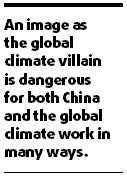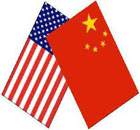Op-Ed Contributors
It's dangerous to make China a climate scapegoat
By Dennis Pamlin (China Daily)
Updated: 2010-01-06 07:49
 |
Large Medium Small |

The outcome of the climate negotiations in Copenhagen has been discussed intensively over the last couple of weeks. A number of Western politicians tried to blame China for the lack of progress as the meeting in Copenhagen failed to deliver the necessary outcome. This blame game in international media was part of a trend where China increasingly has been described as the main obstacle for constructive global climate work over last year.
For everyone who is familiar with China's low carbon work it is easy to be frustrated that China should be made a scapegoat for the lack of action in the area of climate. Four things make this scapegoat role wrong, unfair and dangerous:
First, the fact that China has played a constructive role in trying to get a good deal in Copenhagen, especially the last three years. China's proactive engagement has been recognized by experts working with China, including academics, policymakers and NGO's. China have submitted many proposals and engaged in a way that supports a global, rather than only a short-term nationalistic, agenda. It is also important to remember that it is the Western countries that have filled the atmosphere with greenhouse gases, have the highest emissions per capita and that are building factories around the world to feed their overconsumption.
Second, that China has strong domestic policies and makes real investments in a low carbon economy. These policies and investments are much more advanced than what Western countries did when they went through the industrialization phase of development and in many cases even better than what Western countries are doing today. For example, during 2009 China installed more wind power than the US, China leads the world in making solar cells, China is a leading manufacturer of key energy efficient solutions like energy efficient light bulbs and maybe most importantly China is now supporting innovative solutions for low carbon city development that allow people to live a high quality life without large emissions.

Third, that China has been very active in bilateral collaboration in order to support a low carbon development with EU, US and Japan as well as in South-South cooperation. Just before Copenhagen, China had bilateral meetings with both EU and the US where many important collaborations in renewable energy, smart grids, smart buildings and electric cars were included.
Fourth, the world must not forget that China is still a developing country and that China still has tens of millions of people in poverty. China is still investing in basic infrastructure and so far there is no developed country that is moving towards a low carbon infrastructure.
As the picture of China as the global climate villain is wrong and unfair it is important to understand that it will have real implications unless it is corrected very soon. An image as the global climate villain is dangerous for both China and the global climate work in many ways as foreign policymakers, companies and citizens make decisions based on what they think is true, not reality.
A high carbon image will, for example, discourage innovative companies to invest in China and encourage dirty and bad companies to invest. The image also will affect Chinese companies and their opportunity to export or to get established abroad. This will not only have a negative impact on China, but also on the global work to reduce emissions.
In order to support a more correct understanding of China it is important that policymakers in China consider a review of the current transparency, communication and engagement policies. During 2010 China could launch a "Go Global Green"-strategy, inspired by the current Go Global strategy. The new strategy should consider the following two issues:
First, there are no global institutions or global media. What is often referred to as global media, e.g. CNN, BBC, Reuters, AFP, Bloomberg are all Western media that still are dominated by Western perspectives. The same is true for many of the institutions, think tanks and NGOs that are called global. It is important that these institutions are given access to correct information, but also that they are invited to participate and discuss the information provided. A scientific approach where information is allowed to be criticized and discussed is important.
Second, there is a growing need for global transparency in areas where national policies have global impacts. Information about emissions of greenhouse gases is only one area where global transparency will be increasingly important. Two key areas that should be discussed and where China could play an important role is how national policies and measures affect global resource use, and poverty reduction should become transparent and reported to the global community.
Today the EU, Japan and especially the US have a very high natural resource use per capita. They also have many policies that make it difficult for poor countries to help their population out of poverty. The development of measurement and reporting in natural resource use and poverty reduction will be key in the 21st century and China could take the initiative, together with other interested countries, to develop reporting criteria for these areas.
In order to turn the current negative situation into an opportunity a twin track approach could be deployed. One should be short-term strategy to ensure that China is not seen as the global climate villain after the outcome in Copenhagen and the other, long-term strategy to support better understanding of China as a supporter of a global low carbon and sustainable development.
A credible short-term strategy for the Chinese government could include an official Chinese climate action report, an official engagement strategy and a world tour.
The report would explain the Chinese perspective on the preparations leading up to Copenhagen with China's submissions and proposals explained. It would also include a discussion on what China sees as the key lessons from negotiations so far. The work with the Copenhagen Accord should be presented, and how China sees future negotiations will ensure a role for different stakeholders.
It would also be good if the report included China's views regarding key issues such as Kyoto Protocol in relation to long-term cooperative action, a legally binding deal, commitment from different countries, transparency in reporting emissions and actions, technology exchange and collaboration. In the report China could also allow external voices to present their views regarding the weakness of China's positions.
Almost all of the above already exist in different documents in Chinese and in English, but it would be very valuable to have them collected in a report and make them available in English. As important as the final report would be to develop the report through an engagement process where stakeholders from China and abroad are involved. In order to ensure a thorough engagement and dissemination of the final report a two-step world tour should be considered. The first step would be during the engagement process when the report is written and the second would be seminars around the world to present the final report.
In parallel with the short-term strategy the work could also begin with a long-term strategy.
One key part of this long-term strategy could be to establish centers for a global circular economy around the world. These centers can be virtual or physical, the important thing is that they allow for a place where Chinese initiatives for a better planet can be presented and discussed.
The current situation might be frustrating, but it offers a unique opportunity to provide information to people around the world about China.
The author is adviser to various companies, governments and NGOs.
(China Daily 01/06/2010 page9)













